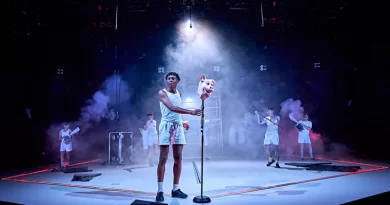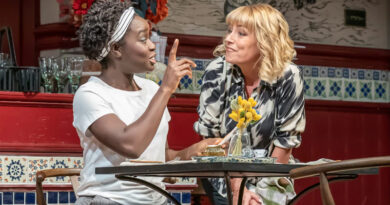“Translations”: National Theatre
Jeremy Malies on the South Bank
23 October 2019
Orson Welles said that writers hit peak popularity two or three years after their death. It’s certainly true of Brian Friel whose Aristocrats is reviewed elsewhere in this issue. Several of his plays were performed during the festival season in Lughnasa FrielFest across Derry, Londonderry and Donegal.
Friel’s 1980 work, Translations, regarded by many as his masterpiece, was another summer offering at the National Theatre. The formal conceit is quite a lot to buy into. The setting is a rural night school (a ‘hedge school’) in the Irish-speaking community of Baile Beag, Donegal, in 1833 where the locals are learning arithmetic, geography and classical languages. The British army has just arrived to survey the area and create a map, ostensibly so that taxes can be levied more equitably. The audience is asked to imagine that the Irish characters are speaking in Irish Gaelic (in reality they speak English) except on a few occasions when the school teachers who are bilingual flit between the two languages while both villagers and soldiers are on stage. The best gags (and some of the saddest misunderstandings) concern what is lost or wilfully changed in translation.

Ciaran Hinds and Julian Moore-Cook (foreground.)
Photo credit: Catherine Ashmore.
As is usual with Friel, recurrent themes involve naming, describing and decoding. The acting is uniformly first-rate with the cast drawing us skilfully into the linguistic games as Latin nouns are declined and verbs conjugated. Ciáran Hinds as the elderly teacher orchestrates the wordplay while reinforcing a stage direction that this is a character who often deliberately parodies himself. His idealism contrasts with the cynicism of his younger son (Colin Morgan) who has sold out to the British army and is serving as their interpreter.
Director Ian Rickson steers the actors through the linguistic thickets and ensures that the often cerebral humour finds its mark. Dermot Crowley impresses as an alcoholic bachelor who is fluent in Greek and Latin. He believes himself to be partially in the ancient world and announces that he is going to marry Athene. Asked if her father has assented, Crowley convulses a packed Olivier: “I’m meeting Zeus tomorrow.”
The romantic interest is between Judith Roddy as local girl Maire and Adetomiwa Edun as Yolland, a junior British officer. The pair succeed with the play’s signature scene in which each makes an identical declaration of love in their respective language with minimal understanding of what the other is saying. The audience is left to revel in the symmetry. Earlier, Edun’s character has made a few overtures to the villagers in pidgin Latin. There is delicious irony in the fact that at Cambridge University, Edun excelled as a classics scholar. The lieutenant is the most eager of the Englishmen to learn a new language and the quickest to integrate but the villagers choose to kill him after what they know has been an innocent tryst.

Adetomiwa Edun, Colin Morgan and Seamus O’Hara.
Photo credit: Catherine Ashmore.
The production remains rooted, as it should be, in 1833 with William IV on the throne of England and Ireland not far from the Great Famine. But it’s by no means a period piece and you could probably draw broad modern comparisons with drone and satellite mapping by predatory engineering companies in the Developing World. I saw parallels between the colonial army’s disdain for the villagers and what is likely to be a cavalier attitude from Westminster to a hard border between Eire and Northern Ireland post-Brexit. The action ends with wanton destruction as the army razes the neighbourhood in revenge for the loss of their officer. If anything, the descendants of Friel’s villagers are having the last laugh as use of their derided Gaelic is on the rise and the Irish economy thrives within the European Union.
Ian Rickson uses a light touch throughout and gives the play plenty of room to breathe with an uncluttered set and little stage business. He has appreciated the structural brilliance of the writing which, despite its complicated nature, is surprisingly robust and instantly acquires momentum.
As a programming choice by Rufus Norris, artistic director of The National, it’s an inspired decision and a fitting tribute to the author. The production shows intellectual rigour, artistic integrity and brilliant acting as it occupies a hinterland between the literal past and a past embodied in literature. At the close of one of his final speeches, Ciarán Hinds reflects: “Words are signals, counters. They are not immortal.” Friel would hate to think that there could be anything resembling a definitive version of his plays and is on record as saying that we must constantly renew our view of poetry and drama. If not definitive, this is a staggering treatment of an imperishable work.









